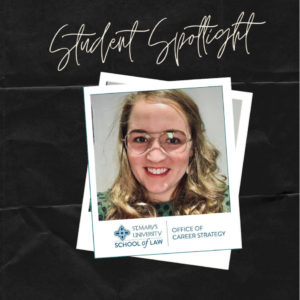Grace Erwin
Texas RioGrande Legal Aid Foster Youth Justice Project – San Antonio, TX

How did you get your job?
I found great opportunities and applied for them through the traditional avenues, like CORE, and participated in the UT Public Service Career Fair. I found my top choice summer program from a completely unrelated Pro Bono Clinic training offered by St. Mary’s. The presenter gave a short intro about her background and happened to be doing what I dream of doing at TRLA. If I had not attended this training, I would have never met my current supervisor and landed my dream internship with TRLA clerking for the Foster Youth Justice Project and the Immigration Team. At orientation they tell you to do pro bono because its required, but it has helped me get connected and involved in the community. I have learned more practical legal skills doing pro bono than in class.
What was the most surprising thing you learned at your job?
I was surprised at how small the world really is. I worked with clerks from Harvard, Yale, and did projects with international NGO’s. I also completed assignments for attorneys whom I had met from previous pro bono projects completely unrelated to my internship. I constantly heard names that I recognized and it seemed that everyone in public interest was so interconnected and familiar with each other. I was surprised to see many people content with the jobs they have. Working in public interest/legal aid is not glamorous. Most people do not get into it for the money. It is long hours, hard work, coupled with emotional situations, with little gratitude for the work you do. Even with the rigorous schedule and emotional toll, many of the attorneys I met took comfort in the impact they make each day, some of them staying 20-30 years with their organization.
What do/did you like most about your job?
My favorite part of my job was being surrounded by like-minded people who were just as motivated as I am to help the most vulnerable in our community. I worked with phenomenal, dedicated individuals who genuinely wanted to help make the world a safer, more tolerant place. That is the reason I came to law school.
How do you think this experience has helped you in your career path?
I came to law school with a pretty good idea of what I wanted to do and this clerkship solidified that. Working at TRLA with the foster youth and immigration teams has given me an invaluable taste of public interest life. I was nervous about being able to handle the emotional toll of the cases and my experience solidified that. It was difficult and trying, but in the wake of the pandemic, TRLA was able to provide support and resources to help their employees and clerks through it. Through this process, I learned how to have a work/life/school balance. I was also able to see the immense, far-reaching difference an organization like TRLA can have on a community. I am positive that this is the right thing for me.
What is the most valuable thing you’ve learned at this job?
This experience confirmed my “life mantra” that you truly have to be bold to succeed. You have to put yourself out there, give it all you’ve got, and be ready to fail but keep going. I created this clerkship around my interests. Over the summer, I volunteered to do extra work and participate in projects with other departments such as Migrant Worker’s Rights, Public Health Crisis, or Human Rights work. I wanted to learn as much as I could with the limited 10-12 weeks I had. I could have easily sat back and only did the work assigned to me or taken the summer off and used Covid-19 as an (valid) excuse to take a break from school. But as many attorneys told me, you do not learn the law in law school, you learn the law by being a lawyer. You learn by working in the community and helping people with their legal needs. Law school is needed to learn the basics but real hands-on work experience is how you learn the law. Even with this experience being solely online, I was able to get hands-on experience through trainings TRLA hosted, zoom/facetime interviews, phone intakes, and skype calls.